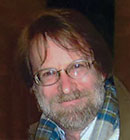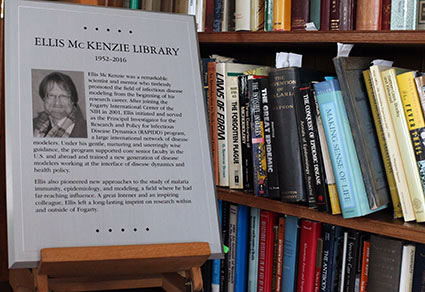Co-founder of Fogarty's RAPIDD modeling program Dr Ellis McKenzie is remembered
May / June 2017 | Volume 16, Issue 3

Dr. Ellis McKenzie
By Karin Zeitvogel
Fogarty senior scientist Dr. Ellis McKenzie was remembered at a special conference in May, not just for his role in adding mathematical modeling to the armamentarium of scientists and policymakers, but also for the positive change he brought to researchers' careers.
A co-founder of Fogarty's Research and Policy for Infectious Disease Dynamics (RAPIDD) program in 2008, McKenzie "brought modeling from a small area of research that was not fully appreciated to something that is valued today," said Fogarty Director Dr. Roger I. Glass at the two-day symposium held at NIH in honor of McKenzie, who died of cancer in 2016.
McKenzie joined Fogarty in 2001 as a staff scientist. He held a Ph.D. from Harvard and completed a postdoc in applied biology. Early in his career, he had worked in marketing and communications after earning a bachelor's degree at the University of California, Santa Cruz.

Photo by Karin Zeitvogel
Fogarty's library in the Stone House has been dedicated to
the memory of Dr. Ellis McKenzie.
The RAPIDD program he helped establish is credited with enhancing the understanding of a range of pathogens - sometimes, as was the case with Ebola and Zika, as they grabbed headlines in newspapers and on home pages of websites in recent years - and of transforming the careers and expanding the horizons of young scientists, conference participants said.
"Ellis reshaped our vision of things, pushed us to orient our models toward a policy-focused audience," said Dr. Matt Ferrari, an associate professor at Penn State University, who was supported by RAPIDD at the start of his research career. "Ellis helped us to make our science more relevant. Many of us thought that we were talking to other scientists - none of us saw that basic science was linked to the kinds of things that were integral to operational government functioning until Ellis connected the dots for us."
The RAPIDD program organizes workshops to provide training in modeling and a platform for collaboration. Its members publish numerous research papers - currently totaling over 1,000, with some 36,000 citations. The career trajectories of the postdoctoral fellows involved in RAPIDD also speak to the program's success. They have moved on to tenured faculty positions, fellowships at leading universities, jobs in U.S. government agencies or leadership roles abroad. "Choosing the best people, giving them freedom, having strong quality control but with a light touch on outputs...were absolutely key to RAPIDD's achievements," Dr. Bryan Grenfell of Princeton told the conference.
The symposium remembered not only the accomplishments of RAPIDD members, but also the impact McKenzie had on them. Dr. Wendy Prudhomme O'Meara, a former postdoctoral student of McKenzie, said he inspired her work in malaria diagnosis, treatment and drug resistance, and cultivated a love of history in her with his belief that understanding the past helps to better predict the future and act in the present. Dr. David Smith of the Institute for Health Metrics and Evaluation (IHME) at the University of Washington said he owes "a debt to Ellis for my entire career in malaria and for shaping a lot of my opinions about science. He was a careful thinker and good scientist." Former RAPIDD fellow, Dr. Kim Pepin, a biologist at the U.S. Department of Agriculture, credited McKenzie with teaching her to patiently mentor and lead others. Another RAPIDD fellow, Dr. Seth Blumberg, said McKenzie gave him "a framework for putting science in the broader context of life."
A weeping cherry tree was planted outside Fogarty's Stone House on the NIH campus in memory of McKenzie. The Center's library was also dedicated to him, and scores of books from his extensive collection - many about his research passion, malaria - were aligned on the shelves, the tattered strips of paper that were inserted in them by McKenzie to mark interesting or important sections still protruding from between the yellowing pages.
"Looking at where the bookmarks are, you can see the thoughts and ideas that inspired Ellis," O'Meara said. "He's very sorely missed."
More Information
To view Adobe PDF files,
download current, free accessible plug-ins from Adobe's website.